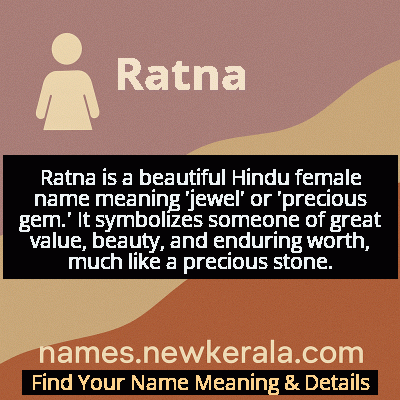Ratna Name Meaning & Details
Origin, Popularity, Numerology Analysis & Name Meaning of Ratna
Discover the origin, meaning, and cultural significance of the name RATNA. Delve into its historical roots and explore the lasting impact it has had on communities and traditions.
Name
Ratna
Gender
Female
Origin
Hindu
Lucky Number
9
Meaning of the Name - Ratna
Ratna is a beautiful Hindu female name meaning 'jewel' or 'precious gem.' It symbolizes someone of great value, beauty, and enduring worth, much like a precious stone.
Ratna - Complete Numerology Analysis
Your Numerology Number
Based on Pythagorean Numerology System
Ruling Planet
Mars
Positive Nature
Generous, passionate, energetic, and humanitarian.
Negative Traits
Impulsive, impatient, moody, and can be overly emotional.
Lucky Colours
Red, maroon, scarlet.
Lucky Days
Tuesday.
Lucky Stones
Red coral, garnet.
Harmony Numbers
1, 2, 3, 6.
Best Suited Professions
Military, sports, philanthropy, leadership roles.
What People Like About You
Courage, energy, leadership, generosity.
Famous People Named Ratna
Ratna Pathak Shah
Actress
Celebrated Indian actress known for iconic roles in television and cinema
Ratna Sarumpaet
Activist and Playwright
Prominent Indonesian human rights defender and cultural figure
Ratna Fabri
Classical Singer
Renowned Hindustani classical vocalist preserving traditional music
Ratna Vincent
Journalist
Senior news anchor and journalist with India's national broadcaster
Name Variations & International Equivalents
Click on blue names to explore their detailed meanings. Gray names with will be available soon.
Cultural & Historical Significance
The name embodies the Hindu belief that every individual possesses inherent divine qualities waiting to be polished and revealed, much like a rough diamond being cut to reveal its brilliance. Throughout South Asian history, Ratna has been used to denote something of exceptional value, whether referring to people, places, or spiritual concepts, making it a name that carries centuries of cultural weight and spiritual symbolism. In many Hindu families, naming a daughter Ratna expresses the parents' view of their child as a precious gift and their hopes that she will develop into someone of great value and character.
Extended Personality Analysis
Women named Ratna are often perceived as possessing qualities reminiscent of precious gems - valuable, multifaceted, and enduring. They tend to exhibit inner strength and resilience, capable of withstanding pressure while maintaining their core integrity, much like diamonds formed under immense geological forces. Typically, Ratnas are known for their refined taste, attention to detail, and ability to appreciate beauty in various forms. Their personality often shines with a quiet confidence that doesn't demand attention but naturally draws people toward them.
Many Ratnas demonstrate exceptional loyalty in relationships and possess a nurturing quality that makes others feel valued and cherished. They often have a deep sense of self-worth without being arrogant, understanding that true value comes from within rather than external validation. This combination of strength, beauty, and substance makes Ratnas often sought after as friends, partners, and leaders in their communities. Their approach to life tends to be thoughtful and considered, with an appreciation for quality over quantity in all aspects of life from relationships to personal possessions.
Modern Usage & Popularity
In contemporary times, Ratna remains a popular name across India, Nepal, Indonesia, and other South Asian communities worldwide. While it may not rank among the top 100 most popular names in urban centers, it maintains steady usage particularly in traditional families and regions with strong cultural preservation. The name has seen a resurgence among diaspora communities seeking to maintain cultural connections while honoring their heritage. Modern parents often choose Ratna for its elegant simplicity, deep cultural roots, and the positive attributes associated with jewels - value, beauty, and durability. In professional spheres, women named Ratna are found across various fields from arts to sciences, carrying the name with pride and often living up to its precious connotations through their accomplishments and character. The name continues to be favored for its timeless quality and the aspirational values it represents.
Symbolic & Spiritual Meanings
Symbolically, Ratna represents much more than physical precious stones. It embodies the concept of inherent worth, potential, and the idea that every person contains divine sparkles waiting to be revealed. In spiritual contexts, Ratna symbolizes the jewel of enlightenment or the precious nature of consciousness itself. The name carries metaphors of transformation - like rough stones being polished to reveal their brilliance, suggesting human potential through personal growth and refinement. It also represents rarity and uniqueness, implying that each individual bearing this name carries special qualities that distinguish them. In relationship contexts, Ratna symbolizes enduring value and the precious nature of genuine connections that withstand the test of time. The symbolic meaning extends to represent inner treasures such as wisdom, compassion, and integrity - qualities that are truly precious and everlasting, far beyond material wealth.

